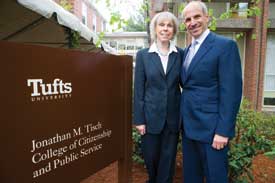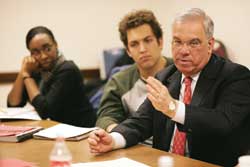Act locally
& globally
The spirit of active citizenship finds
a permanent home at Tisch College
by Michael Blanding
photographs by Melody Ko
On a rainy day in May, some 150 students, faculty members, and trustees crowded into a small tent outside Lincoln Filene Hall. "Thank you for joining me on this wonderful, sunny day—for Tufts," beamed President Lawrence S. Bacow.
As he went on to speak of "contributing to democracy and society" and "educating the next generation of engaged public citizens," the assembled guests knew exactly what the president was talking about—many of them had been steeped in those concepts their entire time at Tufts.
A few minutes later, Bacow helped untie a velvet coverlet to expose the new name of what may soon be one of the university's defining institutions: the Jonathan M. Tisch College of Citizenship and Public Service. Under the name it bore for six years—the University College of Citizenship and Public Service— the school cut across disciplines to infuse Tufts' curriculum with opportunities for public service
and active citizenship. But the renaming this spring marks a turning point in the evolution of the college, and of Tufts, by ensuring that the idea of "making the world a better place" is now locked into the life of the university.
The opportunity comes thanks to Jonathan M. Tisch, A76—Tufts trustee, chairman and CEO of Loews Hotels, and co-chairman of Loews Corporation—who donated $40 million to ensure a permanent endowment for the college. "Jonathan Tisch was an early advocate for the creation of the University College," said Bacow. "Since that time, he has consistently championed Tufts' bold active-citizenship initiative. This gift is in keeping with his personal commitment to corporate responsibility and his extensive community and philanthropic activities."
The gift—the third largest in Tufts' history, and the largest ever given to a college specifically to foster public service—will find no shortage of uses. It will help continue the college's Scholars Program, faculty fellowships, and seed grants for curriculum development. In the long term, it will allow the college to reach out in new areas, making Tufts a leader in a field that is both more popular and—with natural and man-made disasters making headlines daily—more necessary than ever.
Speaking at the renaming ceremony, Tisch predicted the college would cement Tufts' reputation as a "world-class" institution. Tufts now has "the opportunity to become one of the elite universities," he said, "and to educate the future leaders of our country about their responsibilities to others. Tisch College will teach them at every level what they can do to make a difference in people's lives, not only in the United States but around the world."
The dream that Tisch helped nurture at trustee meetings in the late 1990s became a reality when the University College was funded by grants of almost $20 million from Pierre Omidyar, A88, the founder of eBay, and his wife, Pam, A89. The Omidyars envisioned the gifts as seed money. "They said if this is successful, someone will come along to carry it," says Tisch College's director and associate dean, Nancy Wilson. "In a sense the new gift takes something that was experimental and says this will be part of the Tufts experience forever."
 |
Change agents
At the core of the college's work is the Scholars Program, which connects students to outside organizations according to their skills and interests. The program doesn't end there, however; through a series of classes and discussions, faculty advisers help students understand and meet the needs of their community partners. "Instead of waking up one morning and saying ‘I feel like volunteering,' the college gives you the tools and the context to spend your time effectively," says Chelsea Bardot, A06, who attended the renaming ceremony along with a dozen of her fellow student scholars.
Through the program, Bardot helped the Mystic River Watershed Association, an environmental advocacy organization, put together a database of newspapers and magazines in the area. She then bombarded editors with press releases on issues like water pollution and storm-water management, scoring stories in several local newspapers and the Boston Globe. It was exactly what the overburdened nonprofit didn't have time to do itself. And it made Bardot, who grew up in Connecticut, feel like she could call Medford home. "When I think about my Tufts experience," she says, "it's been defined by my experience at University College more than by my classes, or what I read, or what I choose to do with
my free time."
Another student, Angela Lee, A07, worked with Greater Boston Legal Services to translate for poor clients in Chinatown. In a memorable case, she was able to help a woman who had been sexually abused by her boss at a fast-food restaurant. "One day she decided that she wasn't going to put up with it. She came and filed a claim and got access to the system," recalls Lee. "It was rewarding just to see the impact on a person who would otherwise be invisible."
It's not only students who reap the benefits of the college's expertise. To date, dozens of faculty fellows have received support for research projects involving issues as far afield as peace accords in Bosnia and as close to home as childhood obesity in Somerville, Massachusetts. The college is now implementing a research center to enable faculty to collaborate with one another on outside research projects. That idea grew out of the Tisch faculty fellowship of Doug Brugge, an associate professor of public health. The Tufts Community Research Center, as it is called, officially kicked off its work this spring with an application by Brugge and six other faculty members for a grant from the National Institutes of Health. The grant would allow them to study the effect of air pollution on Chinatown, a community clogged every rush hour with cars fleeing downtown Boston, and plagued with higher-than-average childhood asthma rates.
The next step in faculty development will be to raise funds for ten or more universitywide endowed chairs, at $3 million apiece. The new chairs would help conduct research and develop courses integrating public service into all of the schools at the university. For example, a chair at Tufts Medical School might investigate infectious diseases, while one at the Engineering School might focus on green building techniques. "Tufts would be the first university to have in place this visible network of chairs that would intellectually anchor citizenship in the schools,"
says Tisch College's dean, Rob Hollister. "With the prestige and support that an endowed chair represents, it would really communicate that academic excellence and public service go hand-in-hand."
The first endowed chair, inaugurated in 2002, is named after President Emeritus John DiBiaggio, under whom the college was founded. The chair's latest occupant is childhood development professor Maryanne Wolf, who will continue her research into how learning disabilities are caused by miswiring in the brain. In keeping with the ideals of the new college, Wolf has developed methods to train the brain to overcome those disabilities, and has recruited students to use them to teach children at area schools.
 |
|
Media savvy
Another area of curriculum development the new endowment will help expand is the Media and Public Service (MPS) program, a joint enterprise between Tisch College and the department of Communications and Media Studies (CMS). The department has already been offering courses in media literacy and documentary film production; it will now become a full-fledged concentration. "We truly believe that in order to be an active citizen in the 21st century, you have to understand the conventions of the media," says CMS director Julie Dobrow, who recently also became the new director of MPS. "We want our students to be able to read the messages of media, and if they choose to produce messages, to understand the power of the media to make a difference." Recently, a film about biodiesel cars
produced by one MPS student won a college Emmy award, beating out entries from universities with actual film schools. The department is now developing new classes to explore the power—and limitations—of new media such as blogs and podcasts.
It's that kind of cutting-edge thinking that has made Tufts a nationwide leader in embedding public service into community life. "To get kids to do a lot of nice community service isn't hard," says Elizabeth Hollander, director of Campus Compact, a national organization that fosters civic engagement at colleges. "The next step is to get students committed to understanding how they can make and change policy. It's that conscious journey to the next level that I see Tufts really thinking about. It's the only institution I know of with the concept of a college
that stretches across the whole university. That's huge for us."
Since the renaming ceremony, Dean Hollister has been besieged with emails and phone calls from other schools wanting advice on implementing similar programs. "The scale of this investment has a powerful effect in elevating awareness across the country," he says. "It really opens up new opportunities to share our experiences with our sister institutions." Among his short-term goals is starting an international citizenship award that will recognize preeminent scholars doing social justice work and bring them to campus to speak. Another initiative in the works will sponsor visiting scholars, who would come to Tufts for research sabbaticals.
For student scholars like Bardot, who took a summer job as an intern at the Environmental Protection Agency after graduation, the biggest gift of the new endowment is that the college will survive to inspire a new crop of incoming freshmen. One of her fellow scholars, Bardot says, came to Tufts specifically because of the college. "When I first entered the Scholars Program, there was this mystery about what it was," she says. "In four years the perception has changed, so now every student feels like they can walk into Lincoln Filene Hall [Tisch College's home base] and find opportunities for public service. If you have an idea kicking around, that's just the place you go." 
Michael Blanding, a Boston-based freelance writer, has taught magazine writing at Tufts' Experimental College.
|

